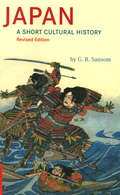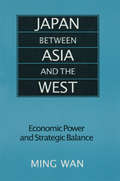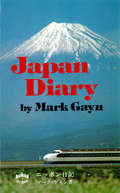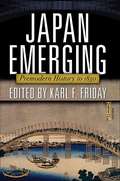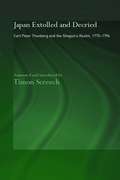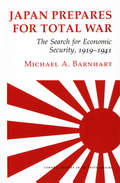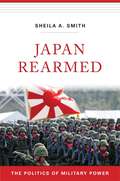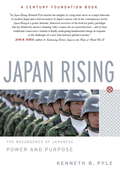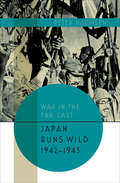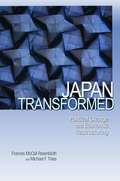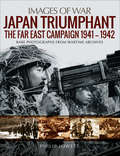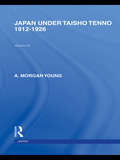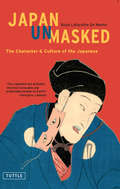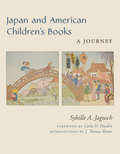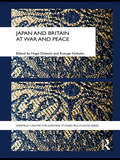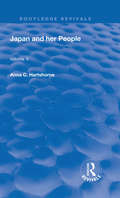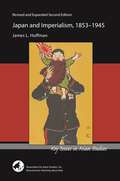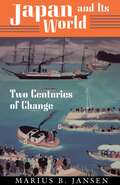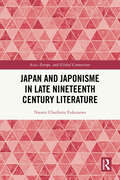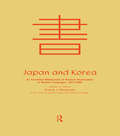- Table View
- List View
Japan A Short Cultural History
by G. B. SansomJapan: A Short Cultural History was first published in 1931 by the Cresset Press in London and D. Appleton in New York. Writing in the Journal of American Oriental Society in 1959, Edwin O. Reischauer, Harvard professor and leading scholar in Japanese history and culture (and future United States Ambassador to Japan) said this of George Sansom's comprehensive account of Japanese history
Japan After Japan: Social and Cultural Life from Recessionary 1990s to the Present
by Tomiko Yoda Harry HarootunianThe prolonged downturn in the Japanese economy that began during the recessionary 1990s triggered a complex set of reactions both within Japan and abroad, reshaping not only the country's economy but also its politics, society, and culture. In Japan After Japan, scholars of history, anthropology, literature, and film explore the profound transformations in Japan since the early 1990s, providing complex analyses of a nation in transition, linking its present to its past and connecting local situations to global developments. Several of the essayists reflect on the politics of history, considering changes in the relationship between Japan and the United States, the complex legacy of Japanese colonialism, Japan's chronic unease with its wartime history, and the postwar consolidation of an ethnocentric and racist nationalism. Others analyze anxieties related to the role of children in society and the weakening of the gendered divide between workplace and home. Turning to popular culture, contributors scrutinize the avid consumption of "real events" in formats including police shows, quiz shows, and live Web camera feeds; the creation, distribution, and reception of Pokmon, the game-based franchise that became a worldwide cultural phenomenon; and the ways that the behavior of zealous fans of anime both reinforces and clashes with corporate interests. Focusing on contemporary social and political movements, one essay relates how a local citizens' group pressed the Japanese government to turn an international exposition, the Aichi Expo 2005, into a more environmentally conscious project. Another essay offers both a survey of emerging political movements and a manifesto identifying new possibilities for radical politics in Japan. Together the contributors to Japan After Japan present much-needed insight into the wide-ranging transformations of Japanese society that began in the 1990s. Contributors. Anne Allison, Andrea G. Arai, Eric Cazdyn, Leo Ching, Harry Harootunian, Marilyn Ivy, Sabu Kohso, J. Victor Koschmann, Thomas LaMarre, Masao Miyoshi, Yutaka Nagahara, Naoki Sakai, Tomiko Yoda, Yoshimi Shunya, Mitsuhiro Yoshimoto
Japan Between Asia and the West: Economic Power and Strategic Balance
by Ming WanJapan seeks economic competitiveness vis-a-vis the West and economic dominance in Asia, but it mainly competes through cooperative use of economic resources, which facilitates realization of the goals of partner nations. This book studies Japan's balance between the United States and East Asia by focusing on the use of economic power - defense spending, consumption, and investment - to advance Japan's political and strategic as well as economic interests. It also investigates Japan's direct use of economic resources, namely, aid and sanctions, and by extension, discusses Japan's relations with the International Monetary Fund, the World Bank, and the Asian Development Bank.
Japan Diary
by Mark GaynThis book is an eyewitness report of what happened in Japan and Korea during the Occupation years from December 1945 to May 1948.It is also meant to be some other things.<P><P> It is the story of that extraordinary figure General Douglas MacArthur, and the men around him. It is the story of the way American foreign polity operated in one segment of the globe and of the plot and counterplot that went on behind the Japanese throne in the years of war and of the subsequent conspiracy to thwart the Allied purposes. It is the story of the common people in two Oriental lands. It is, finally, the record of the author's education, and not a few readers will find it controversial. But it is an absorbing book nonetheless, and the years that have passed since its first publication have not diminished its value as the chronicle of a highly observant reporter.It is indeed an intriguing panorama that Gayn presents, and whether the reader agrees with him in all of his observations, he can hardly accuse him of being unexciting.
Japan Emerging
by Karl F. FridayJapan Emerging provides a comprehensive survey of Japan from prehistory to the nineteenth century. Incorporating the latest scholarship and methodology, leading authorities writing specifically for this volume outline and explore the main developments in Japanese life through ancient, classical, medieval, and early modern periods. Instead of relying solely on lists of dates and prominent names, the authors focus on why and how Japanese political, social, economic, and intellectual life evolved. Each part begins with a timeline and a set of guiding questions and issues to help orient readers and enhance continuity. Engaging, thorough, and accessible, this is an essential text for all students and scholars of Japanese history.
Japan Emerging
by Karl F. FridayJapan Emerging provides a comprehensive survey of Japan from prehistory to the nineteenth century. Incorporating the latest scholarship and methodology, leading authorities writing specifically for this volume outline and explore the main developments in Japanese life through ancient, classical, medieval, and early modern periods. Instead of relying solely on lists of dates and prominent names, the authors focus on why and how Japanese political, social, economic, and intellectual life evolved. Each part begins with a timeline and a set of guiding questions and issues to help orient readers and enhance continuity. Engaging, thorough, and accessible, this is an essential text for all students and scholars of Japanese history.
Japan Emerging: Premodern History to 1850
by Karl F. FridayJapan Emerging provides a comprehensive survey of Japan from prehistory to the nineteenth century. Incorporating the latest scholarship and methodology, leading authorities writing specifically for this volume outline and explore the main developments in Japanese life through ancient, classical, medieval, and early modern periods. Instead of relying solely on lists of dates and prominent names, the authors focus on why and how Japanese political, social, economic, and intellectual life evolved. Each part begins with a timeline and a set of guiding questions and issues to help orient readers and enhance continuity. Engaging, thorough, and accessible, this is an essential text for all students and scholars of Japanese history.
Japan Extolled and Decried: Carl Peter Thunberg's Travels in Japan 1775-1776
by C.P. ThunbergThis edition makes available once again Thunberg’s extraordinary writings on Japan, complete with illustrations, a full introduction and annotations. Carl Peter Thunberg, pupil and successor of Linnaeus – of the great fathers of modern science – spent eighteen fascinating months in the notoriously inaccessible Japan in 1775-1776, and this is his story. Thunberg studied at Uppsala University in Sweden where he was a favourite student of the great Linnaeus, father of modern scientific classification. He determined to travel the world and enlisted as a physician with the Dutch East India Company. He arrived in Japan in the summer of 1775 and stayed for eighteen months. He observed Japan widely, and travelled to Edo (modern Tokyo) where he became friends with the shogun’s private physician, Katsuragawa Hoshû, a fine Scholar and a notorious rake. They maintained a correspondence even after Thunberg had returned to his homeland. Thunberg’s ‘Travels’ appeared in English in 1795 and until now has never been reprinted. Fully annotated and introduced by Timon Screech.
Japan Prepares for Total War
by Michael A. BarnhartThe roots of Japan's aggressive, expansionist foreign policy have often been traced to its concern over acute economic vulnerability. Michael A. Barnhart tests this assumption by examining the events leading up to World War II in the context of Japan's quest for economic security, drawing on a wide array of Japanese and American sources. Barnhart focuses on the critical years from 1938 to 1941 as he investigates the development of Japan's drive for national economic self-sufficiency and independence and the way in which this drive shaped its internal and external policies. He also explores American economic pressure on Tokyo and assesses its impact on Japan's foreign policy and domestic economy. He concludes that Japan's internal political dynamics, especially the bitter rivalry between its army and navy, played a far greater role in propelling the nation into war with the United States than did its economic condition or even pressure from Washington. Japan Prepares for Total War sheds new light on prewar Japan and confirms the opinions of those in Washington who advocated economic pressure against Japan.
Japan Rearmed: The Politics of Military Power
by Sheila A. SmithModern Japan is not only responding to threats from North Korea and China but is also reevaluating its dependence on the United States, Sheila Smith shows. No longer convinced they can rely on Americans to defend their country, Tokyo’s political leaders are now confronting the possibility that they may need to prepare the nation’s military for war.
Japan Rising: The Resurgence of Japanese Power and Purpose
by Kenneth B. PyleJapan is on the verge of a sea change. After more than fifty years of national pacifism and isolation including the "lost decade" of the 1990s, Japan is quietly, stealthily awakening. <P><P> As Japan prepares to become a major player in the strategic struggles of the 21st century, critical questions arise about its motivations. What are the driving forces that influence how Japan will act in the international system? Are there recurrent patterns that will help explain how Japan will respond to the emerging environment of world politics? American understanding of Japanese character and purpose has been tenuous at best. We have repeatedly underestimated Japan in the realm of foreign policy. Now as Japan shows signs of vitality and international engagement, it is more important than ever that we understand the forces that drive Japan. In Japan Rising, renowned expert Kenneth Pyle identities the common threads that bind the divergent strategies of modern Japan, providing essential reading for anyone seeking to understand how Japan arrived at this moment-and what to expect in the future.
Japan Runs Wild, 1942–1943 (War in the Far East #2)
by Peter HarmsenThe author of Storm Clouds Over the Pacific, 1931–1941 chronicles Japan&’s dramatic reversal of fortune as Allied forces gained advantage during WWII. In early 1942, the Imperial Japanese Army and Navy were advancing on all fronts, humiliating Allied forces throughout the Pacific. In a matter of months, Japan had conquered an area larger than Hitler&’s empire at its apex. Hawaiians and Australians feared a future under Hirohito. The fate of half of mankind was hanging in the balance. But by the end of 1943, the tables had turned entirely. The American-led military machine had kicked into gear, and the Japanese were fighting a defensive battle along a frontline that crossed thousands of miles of land and sea. In Japan Runs Wild, 1942–1943, historian Peter Harmsen details the astonishing transformation that took place in that period, setting the Allies on a path to ultimate victory over Japan. The second installment of Peter Harmsen&’s three-part history, Japan Runs Wild, 1942–1943 continues his comprehensive chronicle of the Pacific Theater during the Second World War. Giving due emphasis to the Japanese-American struggle, Harmsen also sheds light on the other peoples involved, including the British, Australians, Soviets, Filipinos, Indians, and Koreans. Above all, the central importance of China is highlighted in a way that no previous general history of the war against Japan has achieved.
Japan Style
by Geeta K. Mehta Noboru Murata Kimie TadaEnter the world of the stylish Japanese house, where every object in sight is a work of art. Japan Style introduces 20 special residences. With more than 200 color photographs, this book showcases the stunning beauty of old homes, and reveals how they are cared for by their owners.Traditional Japanese homes, with superbly crafted fine wood, great workmanship and seasonal interior arrangements, have an aesthetic of infinite simplicity. Unlike Japanese inns and historical buildings, the houses featured in this book are private property and are not open to public viewing. Japan Style offers a rare glimpse into the intimate world of the everyday Japanese and fascinating insight into the traditional architecture of Japan.
Japan Transformed: Political Change and Economic Restructuring
by Frances Rosenbluth Michael F. ThiesWith little domestic fanfare and even less attention internationally, Japan has been reinventing itself since the 1990s, dramatically changing its political economy, from one managed by regulations to one with a neoliberal orientation. Rebuilding from the economic misfortunes of its recent past, the country retains a formidable economy and its political system is healthier than at any time in its history. Japan Transformed explores the historical, political, and economic forces that led to the country's recent evolution, and looks at the consequences for Japan's citizens and global neighbors. The book examines Japanese history, illustrating the country's multiple transformations over the centuries, and then focuses on the critical and inexorable advance of economic globalization. It describes how global economic integration and urbanization destabilized Japan's postwar policy coalition, undercut the ruling Liberal Democratic Party's ability to buy votes, and paved the way for new electoral rules that emphasized competing visions of the public good. In contrast to the previous system that pitted candidates from the same party against each other, the new rules tether policymaking to the vast swath of voters in the middle of the political spectrum. Regardless of ruling party, Japan's politics, economics, and foreign policy are on a neoliberal path. Japan Transformed combines broad context and comparative analysis to provide an accurate understanding of Japan's past, present, and future.
Japan Triumphant: The Far East Campaign 1941-1942 (Images of War)
by Philip JowettImperial Japan&’s ambitious offensive at the beginning of WWII is captured in dramatic detail in this pictorial history featuring rare wartime photographs. The Japanese offensive in the Far East in 1941-1942 was extraordinary in its ambition, for their aim was to advance across the entire region. They clashed with an array of forces in a series of lightning campaigns that included famous episodes like the raid on Pearl Harbor and the conquest of Singapore. In this vivid photographic history, historian Philip Jowett covers the whole course of the offensive, portraying not only the Japanese military which achieved such incredible success but the armies they overwhelmed. In a sequence of over 200 wartime photographs—many of which have never been published before—Jowett covers the land, sea, and air fighting as the Japanese occupied so much of the region. Rare images of the Japanese forces as they prepared for war and then made seemingly unstoppable progress are matched with images of the armies they surprised and vanquished. Japan Triumphant captures the character of the war in the Far East, showing the appearance, equipment, and weaponry of the armies involved as well as the conditions in which they fought.
Japan Under Taisho Tenno: 1912-1926 (Routledge Library Editions: Japan)
by A Morgan YoungA journalist on the Japan Chronicle for eleven years this volume examines the history, economy, politics and society of Japan from just before the First World War until 1926. Japan’s relations with the West, as well as with Russia and China are also discussed.
Japan Unmasked: The Character & Culture of the Japanese (Tuttle Classics)
by Boye Lafayette De MenteThe growing globalization of world business, culture and communication--and Japan's increasingly important role as a leader in that world--makes understanding Japanese culture critical for business people, diplomats, students, educators and anyone else with an interest in Japan.<P><P>Westerners have recognized--and analyzed--the many unique aspects of Japanese culture since they first set foot in Japan in the 16th century. The special talents (and weaknesses) that characterize the Japanese way of life are by now well-documented. But few Westerners really understand the beliefs and values that underlie how the Japanese think and act, how and why these attributes have been preserved in Japanese culture from ancient times through the modern day, or the critical role they play in today's Japanese society.In Japan Unmasked veteran Japanologist and author Boye Lafayette De Mente explores the social, cultural, and psychological characteristics responsible for the unique nature of modern-day Japanese culture-- the real "face" behind the "mask"--and demonstrates how they have brought the Japanese to their central role on the world stage.
Japan and American Children's Books: A Journey
by Sybille JaguschFor generations, children’s books provided American readers with their first impressions of Japan. Seemingly authoritative, and full of fascinating details about daily life in a distant land, these publications often presented a mixture of facts, stereotypes, and complete fabrications. This volume takes readers on a journey through nearly 200 years of American children’s books depicting Japanese culture, starting with the illustrated journal of a boy who accompanied Commodore Matthew Perry on his historic voyage in the 1850s. Along the way, it traces the important role that representations of Japan played in the evolution of children’s literature, including the early works of Edward Stratemeyer, who went on to create such iconic characters as Nancy Drew. It also considers how American children’s books about Japan have gradually become more realistic with more Japanese-American authors entering the field, and with texts grappling with such serious subjects as internment camps and the bombing of Hiroshima and Nagasaki. Drawing from the Library of Congress’s massive collection, Sybille A. Jagusch presents long passages from many different types of Japanese-themed children’s books and periodicals—including travelogues, histories, rare picture books, folktale collections, and boys’ adventure stories—to give readers a fascinating look at these striking texts. Published by Rutgers University Press, in association with the Library of Congress.
Japan and Britain at War and Peace (The University of Sheffield/Routledge Japanese Studies Series)
by Hugo Dobson Kosuge NobukoSince the events of the Second World War the relationship between Japan and Britain has undergone an extraordinary transformation, from bitter conflict to peaceful alliance. Japan and Britain at War and Peace is a multilayered examination of this bilateral relationship with an emphasis on the issue of reconciliation. Reconciliation is explored in a broad sense and in a number of areas from economic cooperation and conflict, common concerns in the international system, public and media perceptions of each country, and the efforts of individuals, non-governmental organizations and governments to promote mutual understanding and find strategies to deal with dilemmas. With chapters from an international team of contributors from the UK, Japan, and Australia, this book will appeal to students and scholars of Japanese and British history and international politics.
Japan and Her People: Vol. II (Routledge Revivals)
by Anna C. HartshorneThis book provides an overview of Japan in late 19th century and its history. It also provides an insight of Japanese society as it moved from the traditional Edo period lifestyle towards industrialization and explores Japan's lifestyles, customs, culture, and everyday behavior.
Japan and Imperialism, 1853-1945 (Key Issues in Asian Studies)
by James L. HuffmanRevised and Expanded Second Edition. This lively narrative tells the story of Japan’s experience with imperialism and colonialism, looking first at Japan’s responses to Western threats in the nineteenth century, then at Japan’s activities as Asia’s only imperialist power. Using a series of human vignettes as lenses, Japan and Imperialism examines the motivations—strategic, nationalist, economic—that led to imperial expansion and the impact expansion had on both national policies and personal lives. The work demonstrates that Japanese imperial policies fit fully into the era’s worldwide imperialist framework, even as they displayed certain distinctive traits. Japanese expansive actions, the booklet argues, were inspired by concrete historical contingencies rather than by some national propensity or overarching design.
Japan and Its World: Two Centuries of Change
by Marius B. JansenLong recognized as an authority on Japanese history, Marius Jansen synthesizes a lifetime of scholarship in this landmark book. Bringing together the series of Brown and Haley lectures delivered in 1975 at the University of Puget Sound, Japan and Its World continues to be a source of insight for anyone interested in the changing ideas the Japanese have had of themselves, the United States, and the Western world during the past two centuries.
Japan and Japonisme in Late Nineteenth Century Literature (Asia, Europe, and Global Connections)
by Naomi Charlotte FukuzawaThis book examines the transnational phenomenon of Japonisme in the exoticist and “autoexoticist” literature of the late nineteenth century.Focusing on the way in which reciprocal processes of transcultural acquisition – by Japan and from Japan – were portrayed in the medium of literature, the book illustrates how literary Japonisme and the wider processes whereby Japan, with its alien exotic culture and unique refined aestheticism, was absorbing Western civilization in its own way in the late nineteenth century at the same time as the phenomenon of Japonisme was occurring in Western fine arts, which were inspired by traditional Japanese artistic practices. Specifically, the book focuses on the literary works of Lafcadio Hearn and Pierre Loti, who travelled from France and America, respectively, to Japan, and Mori Ōgai and Natsume Sōseki, who in turn went, respectively, to Germany and England from Japan.Exploring the eclectic hybridity of Japan’s modernization during the late nineteenth century, this book will appeal to students and scholars of Japanese Studies, Postcolonial Studies and Comparative Literature.
Japan and Japonisme: The Self and the Other in Representations of Japanese Culture
by Noriko MuraiJapan and Japonisme: The Self and the Other in Representations of Japanese Culture explores Japan’s engagement with and responses to Japonisme, and presents new perspectives on the history and enduring influence of Japonisme as a cultural discourse. The term "Japonisme" has come to encapsulate the West’s interests in Japanese arts and culture in the late nineteenth and early twentieth centuries. Japonisme contributed to Japan’s global reputation as an artistic nation, but it also produced persistent stereotypes about the Japanese, such as the image of "geisha."This pioneering anthology also demonstrates how Japan has espoused the modern Western fascination with its arts and culture to create and promote its national cultural identity. Japan and Japonisme introduces innovative studies on Japonisme by leading experts in the field, and covers the visual arts, art criticism and exhibitions, fashion, literature, horticulture, and popular culture in France, Italy, the United Kingdom, and the United States.
Japan and Korea: An Annotated Bibliography of Doctoral Dissertations in Western Languages 1877-1969
by Frank Joseph ShulmanFirst Published in 1971. This annotated bibliography of doctoral dissertations on Japan and Korea grew out of a decision to expand and bring up to date an earlier list entitled Unpublished Doctoral Dissertations Relating to Japan, Accepted in the Universities of Australia, Canada, Great Britain, and the United States, 1946-1963, compiled by Peter Cornwall and issued by the Center for Japanese Studies in 1965.
